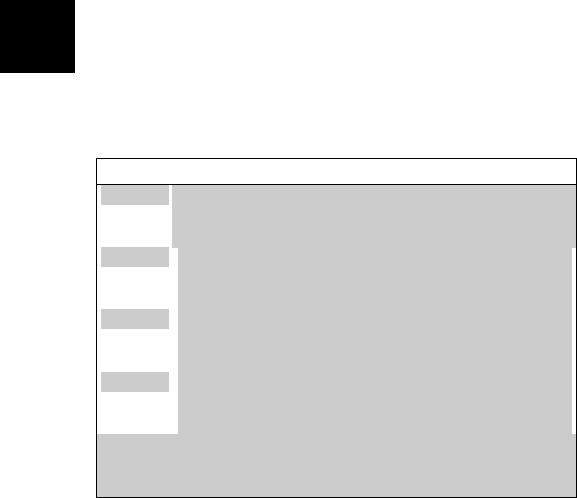
- •Chapter 1. Introduction
- •How to Develop A Program
- •What is an Assembler?
- •Modular Programming
- •Modular Program Development Process
- •Segments, Modules, and Programs
- •Translate and Link Process
- •Filename Extensions
- •Program Template File
- •Chapter 2. Architecture Overview
- •Memory Classes and Memory Layout
- •Classic 8051
- •Extended 8051 Variants
- •Philips 80C51MX
- •Intel/Atmel WM 251
- •CPU Registers
- •CPU Registers of the 8051 Variants
- •CPU Registers of the Intel/Atmel WM 251
- •Program Status Word (PSW)
- •Instruction Sets
- •Opcode Map
- •8051 Instructions
- •Additional 251 Instructions
- •Additional 80C51MX Instructions via Prefix A5
- •Chapter 3. Writing Assembly Programs
- •Assembly Statements
- •Directives
- •Controls
- •Instructions
- •Comments
- •Symbols
- •Symbol Names
- •Labels
- •Operands
- •Special Assembler Symbols
- •Immediate Data
- •Memory Access
- •Program Addresses
- •Expressions and Operators
- •Numbers
- •Characters
- •Character Strings
- •Location Counter
- •Operators
- •Expressions
- •Chapter 4. Assembler Directives
- •Introduction
- •Segment Directives
- •Location Counter
- •Generic Segments
- •Stack Segment
- •Absolute Segments
- •Default Segment
- •SEGMENT
- •RSEG
- •BSEG, CSEG, DSEG, ISEG, XSEG
- •Symbol Definition
- •CODE, DATA, IDATA, XDATA
- •esfr, sfr, sfr16, sbit
- •LIT (AX51 & A251 only)
- •Memory Initialization
- •DD (AX51 & A251 only)
- •Reserving Memory
- •DBIT
- •DSW (AX51 & A251 only)
- •DSD (AX51 & A251 only)
- •Procedure Declaration (AX51 & A251 only)
- •PROC / ENDP (AX51 & A251 only)
- •LABEL (AX51 and A251 only)
- •Program Linkage
- •PUBLIC
- •EXTRN / EXTERN
- •NAME
- •Address Control
- •EVEN (AX51 and A251 only)
- •USING
- •Other Directives
- •_ _ERROR_ _
- •Chapter 5. Assembler Macros
- •Standard Macro Directives
- •Defining a Macro
- •Parameters
- •Labels
- •Repeating Blocks
- •REPT
- •IRPC
- •Nested Definitions
- •Nested Repeating Blocks
- •Recursive Macros
- •Operators
- •NUL Operator
- •& Operator
- •< and > Operators
- •% Operator
- •;; Operator
- •! Operator
- •Invoking a Macro
- •C Macros
- •C Macro Preprocessor Directives
- •Stringize Operator
- •Predefined C Macro Constants
- •Examples with C Macros
- •C Preprocessor Side Effects
- •Chapter 6. Macro Processing Language
- •Overview
- •Creating and Calling MPL Macros
- •Creating Parameterless Macros
- •MPL Macros with Parameters
- •Local Symbols List
- •Macro Processor Language Functions
- •Comment Function
- •Escape Function
- •Bracket Function
- •METACHAR Function
- •Numbers and Expressions
- •Numbers
- •Character Strings
- •SET Function
- •EVAL Function
- •Logical Expressions and String Comparison
- •Conditional MPL Processing
- •IF Function
- •WHILE Function
- •REPEAT Function
- •EXIT Function
- •String Manipulation Functions
- •LEN Function
- •SUBSTR Function
- •MATCH Function
- •Console I/O Functions
- •Advanced Macro Processing
- •Literal Delimiters
- •Blank Delimiters
- •Identifier Delimiters
- •Literal and Normal Mode
- •MACRO Errors
- •Chapter 7. Invocation and Controls
- •Environment Settings
- •Running Ax51
- •ERRORLEVEL
- •Output Files
- •Assembler Controls
- •Controls for Conditional Assembly
- •Conditional Assembly Controls
- •Chapter 8. Error Messages
- •Fatal Errors
- •Non–Fatal Errors
- •Chapter 9. Linker/Locator
- •Overview
- •Combining Program Modules
- •Segment Naming Conventions
- •Combining Segments
- •Locating Segments
- •Overlaying Data Memory
- •Resolving External References
- •Absolute Address Calculation
- •Generating an Absolute Object File
- •Generating a Listing File
- •Bank Switching
- •Using RTX51, RTX251, and RTX51 Tiny
- •Linking Programs
- •Command Line Examples
- •Control Linker Input with µVision2
- •ERRORLEVEL
- •Output File
- •Linker/Locater Controls
- •Locating Programs to Physical Memory
- •Classic 8051
- •Extended 8051 Variants
- •Philips 80C51MX
- •Intel/Atmel WM 251
- •Data Overlaying
- •Program and Data Segments of Functions
- •Using the Overlay Control
- •Tips and Tricks for Program Locating
- •Locate Segments with Wildcards
- •Special ROM Handling (LX51 & L251 only)
- •Bank Switching
- •Common Code Area
- •Code Bank Areas
- •Bank Switching Configuration
- •Configuration Examples
- •Control Summary
- •Listing File Controls
- •Output File Controls
- •Segment and Memory Location Controls
- •High-Level Language Controls
- •Error Messages
- •Warnings
- •Non-Fatal Errors
- •Fatal Errors
- •Exceptions
- •Chapter 10. Library Manager
- •Using LIBx51
- •Interactive Mode
- •Create Library within µVision2
- •Command Summary
- •Creating a Library
- •Adding or Replacing Object Modules
- •Removing Object Modules
- •Extracting Object Modules
- •Listing Library Contents
- •Error Messages
- •Fatal Errors
- •Errors
- •Chapter 11. Object-Hex Converter
- •Using OHx51
- •OHx51 Command Line Examples
- •Creating HEX Files for Banked Applications
- •OHx51 Error Messages
- •Using OC51
- •OC51 Error Messages
- •Intel HEX File Format
- •Record Format
- •Data Record
- •Extended 8086 Segment Record
- •Extended Linear Address Record
- •Example Intel HEX File
- •Appendix A. Application Examples
- •ASM – Assembler Example
- •Using A51 and BL51
- •Using AX51 and LX51
- •Using A251 and L251
- •CSAMPLE – C Compiler Example
- •Using C51 and BL51
- •Using C51 and LX51
- •Using C251 and L251
- •BANK_EX1 – Code Banking with C51
- •Using C51 and BL51
- •Using C51 and LX51
- •BANK_EX2 – Banking with Constants
- •Using C51 and BL51
- •Using C51 and LX51
- •Using BL51
- •Using C51 and LX51
- •Philips 80C51MX – Assembler Example
- •Philips 80C51MX – C Compiler Example
- •Appendix B. Reserved Symbols
- •Appendix C. Listing File Format
- •Assembler Listing File Format
- •Listing File Heading
- •Source Listing
- •Macro / Include File / Save Stack Format
- •Symbol Table
- •Listing File Trailer
- •Appendix D. Assembler Differences
- •Differences Between A51 and A251/AX51
- •Differences between A51 and ASM51
- •Differences between A251/AX51 & ASM51
- •Glossary
- •Index

384 |
Chapter 10. Library Manager |
|
|
Error Messages
This chapter lists the fatal and non-fatal errors that may be generated by the LIB51 library manager during execution. Each section includes a brief description of the message, as well as corrective actions you can take to eliminate the error or warning condition.
10
Fatal Errors
Fatal errors cause immediate termination of the LIB51 library manager. These errors normally occur as the result of a corrupt library or object file, or as a result of a specification problem involving library or object files.
Error |
Error Message and Description |
|
|
215CHECK SUM ERROR
FILE: filename
The checksum for filename is incorrect. This usually indicates a corrupt file.
216INSUFFICIENT MEMORY
There is not enough memory for the LIB51 library manager to successfully complete the requested operation.
217NOT A LIBRARY
FILE: filename
The filename that was specified is not a library file.
219NOT AN 8051 OBJECT FILE
FILE: filename
The filename that was specified is not a valid 8051 object file.
222MODULE SPECIFIED MORE THAN ONCE
MODULE: filename (modulename)
The specified modulename is included on the command line more than once.

Keil Software — A51/AX51/A251 Macro Assembler and Utilities |
385 |
|
|
Errors
The following errors cause immediate termination of the LIB51 library manager. These errors usually involve invalid command line syntax or I/O errors.
|
Error |
Error Message and Description |
|
|
|
10 |
|||
|
201 |
INVALID COMMAND LINE SYNTAX |
|
|
|
|
A syntax error was detected in the command. The command line is displayed up |
|
|
|
|
to and including the point of error. |
|
|
|
|
|
|
|
|
|
|
|
|
202INVALID COMMAND LINE, TOKEN TOO LONG
The command line contains a token that is too long for the LIB51 library manager to process.
203EXPECTED ITEM MISSING
The command line is incomplete. An expected item is missing.
205FILE ALREADY EXISTS
FILE: filename
The filename that was specified already exists. This error is usually generated when attempting to create a library file that already exists. Erase the file or use a different filename.
208MISSING OR INVALID FILENAME
A filename is missing or invalid.
209UNRECOGNIZED COMMAND
A command is unrecognized by the LIB51 library manager. Make sure you correctly specified the command name.
210I/O ERROR ON INPUT FILE: system error message
FILE: filename
An I/O error was detected when accessing one of the input files.
211I/O ERROR ON LIBRARY FILE: system error message
FILE: filename
An I/O error was detected when accessing a library file.
212I/O ERROR ON LISTING FILE: system error message
FILE: filename
An I/O error was detected when accessing a listing file.

386 |
|
Chapter 10. Library Manager |
|
|
|
|
|
|
|
|
|
|
Error |
Error Message and Description |
|
|
|
|
|
213I/O ERROR ON TEMPORARY FILE: system error message
FILE: filename
An I/O error was detected when a temporary file was being accessed.
10 |
|
220 |
|
|
INVALID INPUT MODULE |
|
|
|
|
|
FILE: filename |
|
|
|
|
|
|
The specified input module is invalid. This error could be the result of an |
|
|
|
|
|
|
assembler error or could indicate that the input object file is corrupt. |
|
|
|
|
|
|
|
|
|
|
221 |
|
|
FILE SPECIFIED MORE THAN ONCE |
|
|
|
|
|
|
|
FILE: filename |
|
|
|
|
|
|
The filename specified was included on the command line more than once. |
|
|
|
|
|
|
||
|
223 |
|
|
CANNOT FIND MODULE |
|
|
|
|
|
|
|
MODULE: filename (modulename) |
|
|
|
|
|
|
The modulename specified on the command line was not located in the object or |
|
|
|
|
|
|
library file. |
|
|
|
|
|
|
||
|
224 |
|
|
ATTEMPT TO ADD DUPLICATE MODULE |
|
|
|
|
|
|
|
MODULE: filename (modulename) |
|
|
|
|
|
|
The specified modulename already exists in the library file and cannot be added. |
|
|
|
|
|
|
||
|
225 |
|
|
ATTEMPT TO ADD DUPLICATE PUBLIC SYMBOL |
|
|
|
|
|
|
|
MODULE: filename (modulename) |
|
|
|
|
|
|
PUBLIC: symbolname |
|
|
|
|
|
|
The specified public symbolname in modulename already exists in the library file |
|
|
|
|
|
|
and cannot be added. |
|
|
|
|
|
|
|
|
